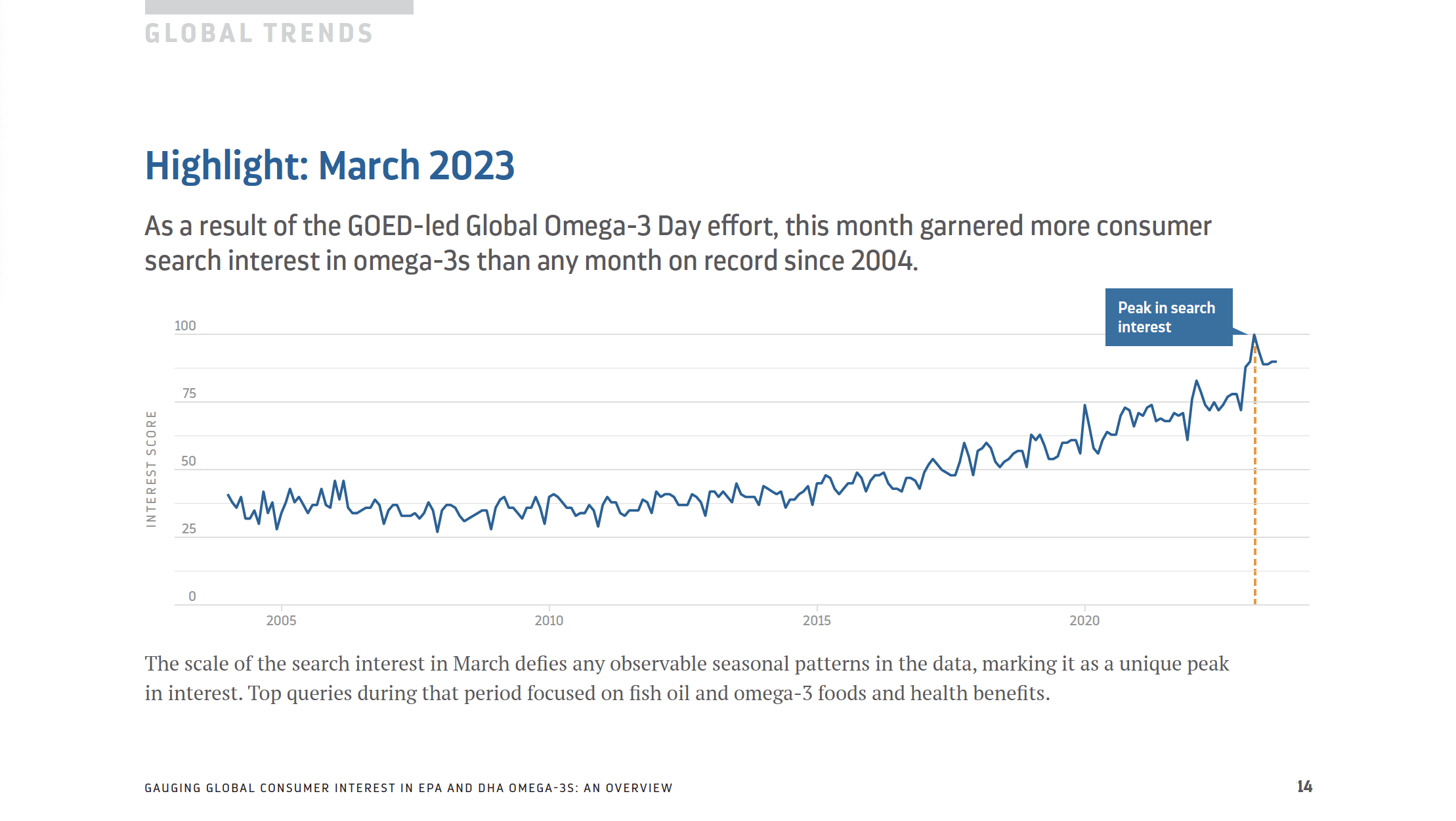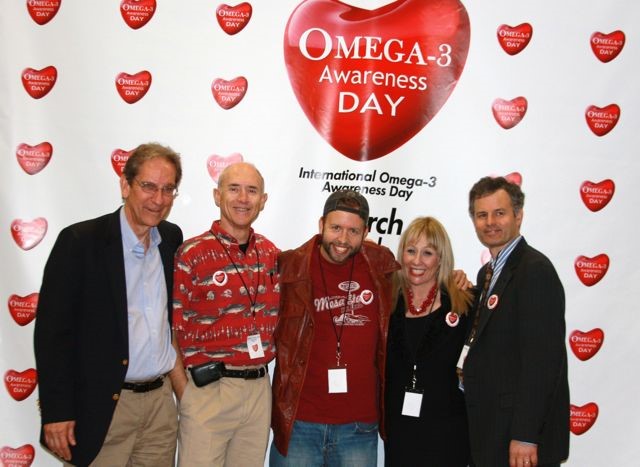Global Omega-3 Day
March 3 (03-03) is Global Omega-3 Day™
This day is an important annual milestone to:
- call attention to EPA and DHA omega-3s,
- share details about their important health benefits, and
- highlight why people need to increase intake.
How You Can Be A Part of This Annual Celebration
- Share information about EPA and DHA omega-3s to consumers via your social media channels. Use the Key Messages below, our Sample Social Media Posts and Graphics in this toolkit for inspiration.
- Host an influencer or consumer-focused event in your market or among your target audiences. This could be a lunch-and-learn with physicians or pharmacists, an in-store event with a major retailer, or a webinar for your customers.
- Pitch media in your market to promote Global Omega-3 Day and to talk about the importance of EPA and DHA omega-3s. Leverage a company spokesperson, work with a local influencer or offer a GOED expert to be interviewed.
- Offer a consumer discount. If you’re a brand, host a “One Day Only” or limited time discount/deal on your products for Global Omega-3 Day. You can use OMEGA3DAY as your discount code to further underscore the day.
- Host a contest or giveaway. Even if you are not a brand, you can host a contest or giveaway for consumers or customers. This could be a monetary prize or fun mailer for a chosen winner (or multiple winners) who do something to support the essence of the day. Perhaps you incentivize people to post on your social media pages what they plan to do in the coming year to increase their omega-3 intake, then you randomly choose a winner. Or you ask people to post a picture or video of themselves taking an omega-3 supplement or eating fatty fish and tagging #globalomega3day (plus a unique hashtag for your contest), and you highlight the winners on your social feeds or website.
Be sure to tag #GlobalOmega3Day and #alwaysomega3s.
The Impact of Global Omega-3 Day™
Due to everyone's efforts in promoting Global Omega-3 Day on March 3, 2023, consumer search interest in omega-3s reached its highest point in any month since 2004.

See all the great messaging seen around the world on March 3, 2023, in this video.
|
|
|
|
Key Messages
- 90% of people worldwide are not getting enough EPA and DHA omega-3s.
- When it comes to omega-3s, EPA and DHA are most important, not just for your heart or during pregnancy, but throughout your entire life.
- The best food source of EPA+DHA omega-3s are fatty/oily fish. You can also get these nutrients from an omega-3 supplement.
- Aim for at least 500mg EPA+DHA per day. Get this from eating fatty/oily fish, eating foods fortified with EPA/DHA, and by taking an omega-3 supplement.
- Pregnant and lactating women should get at least 700 mg per day of EPA+DHA, with at least 300 mg of that as DHA.
Sample Blog Post
EPA and DHA Omega-3s: What You Need to Know
By GOED Director of Consumer and Healthcare Practitioner Communications Elana Natker, RD
There is a pair of nutrients found in every cell of our bodies that helps us perform at our best: EPA and DHA omega-3s. The problem is, 90% of people worldwide are not getting enough of these nutrients. On Global Omega-3 Day, we shine the spotlight on these important nutrients and why we need them.
What Are Omega-3s?
Omega-3s are a type of fatty acids. There are three main types of omega-3s that we get in the diet: EPA, DHA and ALA. EPA and DHA are naturally found in marine products such as fatty fish and microalgae, while ALA, or alpha linolenic acid, is found in plant foods like walnuts, flax and chia seeds. It’s easy to lump all omega-3s together, but ALA does not have the same health effects as EPA and DHA omega-3s.
Why Aren’t People Getting Enough?
Most people simply do not eat enough fish as part of their daily or weekly diets. Even if they are, they might not be choosing the most omega-3-rich sources. Salmon, anchovies, sardines and other oily fish have the most EPA and DHA omega-3s. Tilapia, shrimp and other types of fish are good sources of protein and other nutrients, but not omega-3s. Taking a daily supplement such as fish oil, krill or algal oil (vegetarian EPA/DHA) helps fill dietary gaps.
Omega-3 intake that comes from plant-based sources tend to supply only ALA. While the body is able to convert ALA to EPA and DHA, the process of converting dietary ALA to EPA/DHA is highly variable, so you shouldn’t rely on ALA-containing foods to give you the EPA and DHA your body needs. That’s why it’s important to get EPA and DHA directly from food sources or dietary supplements.
Why You Need EPA and DHA Omega-3s
EPA and DHA omega-3s are among the most studied nutrients, with more than 50,000 published papers. The overwhelming evidence based on human clinical trials suggest that EPA and DHA omega-3s are helpful in supporting heart, brain and eye health throughout life, and prenatal/maternal health, including supporting a healthy pregnancy and early childhood development.
Resolve to Increase Your EPA and DHA
On Global Omega-3 Day, make a plan to get more EPA and DHA omega-3s into your body. You can:
- Commit to eating fatty fish at least twice per week. For a list of the best fish sources of EPA and DHA omega-3s, click here.
- Start an EPA/DHA omega-3 supplement regimen. There are many different types of supplements: fish, krill or algae sources, in softgel, liquid or chewable format. Find the best type for you, and stick to it!
- If you already take an omega-3 supplement, consider increasing your dose. GOED recommends at least 500 mg per day for overall health. If you have a heart condition or are pregnant/breastfeeding, you may need more.
- Talk with your healthcare provider before starting any supplement.
History of Omega-3 Day
| The original International Omega-3 Awareness Day was established in 2010 by Dr. Carol Locke, founder of GOED member OmegaBrite, as a non-profit international initiative to raise awareness of the science and benefits of omega-3 fatty acids. GOED is proud to continue the Global Omega-3 Day™ tradition with an expanded goal, which is to raise awareness of the importance of omega-3s around the world through outreach to stakeholders including those in the omega-3 industry, consumers, key influencers and health professionals. With more than 180 GOED members representing companies throughout the EPA and DHA omega-3 supply chain, we now have many avenues to get the word out about the importance of EPA and DHA omega-3s. |
|
 |

